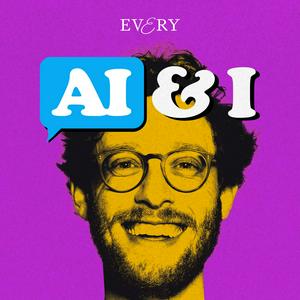Depending on whom you ask, AI is either the best or worst thing that can happen to the next generation. The arguments come from educators, venture capitalists, op-ed writers, and anxious parents—but rarely from the young people in question.
On this episode of AI & I, Dan Shipper sat down with one: Alex Mathew, a 17-year-old high-school senior at Alpha High School in Austin, Texas.
Alpha School, a rapidly expanding network of kindergarten through grade 12 private schools, is not without controversy. Inside Alpha High School, there are no traditional teachers, all academic content is delivered through an AI-powered platform, and the adults in the classroom, known as “guides,” focus solely on supporting the students emotionally and keeping them motivated to learn. The students have two- to three-hour learning blocks every morning and spend the rest of the day going deep on a project in an area they care about, spanning art, sport, life skills, and entrepreneurship.
Mathew’s project is a startup called Berry, built around an AI stuffed animal designed to help teenagers with their mental health. His vision is for teens to talk to the plushie for five to 10 minutes a day and, in the process, learn to recognize and cope with their problems in the right way. In this episode, Dan and Mathew talk about what a day at Alpha High looks like, what keeps students from cheating when AI is everywhere, and how Generation Z—people born between 1997–2012—really feels about college, social media, and books.
If you found this episode interesting, please like, subscribe, comment, and share!
Want even more?
Sign up for Every to unlock our ultimate guide to prompting ChatGPT here: https://every.ck.page/ultimate-guide-to-prompting-chatgpt. It’s usually only for paying subscribers, but you can get it here for free.
To hear more from Dan Shipper:
Subscribe to Every: https://every.to/subscribe
Follow him on X: https://twitter.com/danshipper
In a world of generic AI, don’t sound like everyone else. With Grammarly, you never will. Download Grammarly for free at Grammarly.com.
Intent is what comes after your IDE. Try it yourself: augmentcode.com/intent
Head to granola.ai/every to get 3 months free.
Timestamps:
00:00:00 – Start
00:01:30 – Introduction
00:04:08 – A typical day inside Alpha High School
00:06:54 – Why Alpha replaced teachers with “guides” focused on motivating students
00:12:09 – Why Mathew doesn’t use AI to cheat, even though he could
00:19:51 – Do ambitious teenagers care about going to college?
00:25:12 – Mathew’s take on how Gen Z thinks about AI
00:27:52 – How Mathew thinks about the effects of social media
00:31:29 – Gen Z’s relationship with books and reading
00:38:57 – Mathew ranks ChatGPT, Claude, Gemini, and Grok
00:47:12 – Why Mathew is building Berry, an AI stuffed animal for teen mental health
Links to resources mentioned in the episode:
Alex Mathew: Alex Mathew (@alxmthew)
More about Berry: https://berryplush.com/, Berry (@berryaiplushies)


